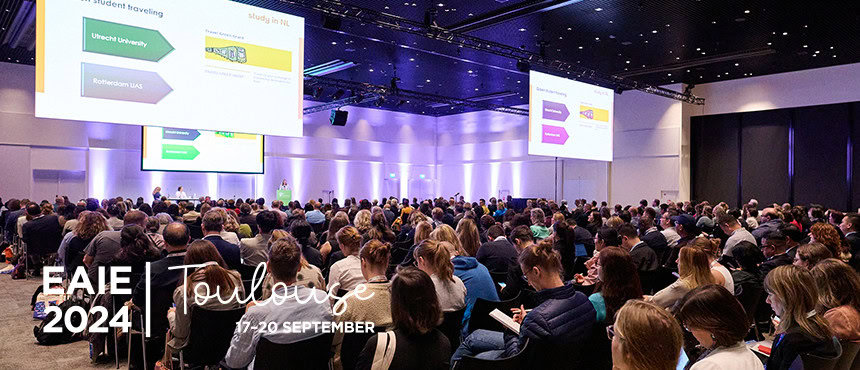Here’s the core question of our profession: How do we arm students with the global and intercultural skills to not only survive in the innovation economy, but thrive in the numerous layers of “place” and “culture” they’ll experience in the world of work? And more pressingly, how do we teach students these skills at scale, beyond the ~10% of undergrads we’ve served over the past 70 years?
Goodbye Mad Men, hello remote work
The days are long gone where the realities of work look anything like an episode of Mad Men. Instead, our students are thrust into the innovation economy where they likely have a remote or hybrid position (or work with people who do). Their colleagues are scattered across the B1G and the G7. Time zone and cultural challenges are just as common as Zoom meetings and inbox overload. Their favorite work “watercooler spot” is their company’s “Kids & Pets” Slack channel. And at every turn, they are engaged in teams and working on projects with people and perspectives vastly different from their own.
While the location and structure of their work will vary, the common characteristic of innovation economy roles is a broad diversity of interactions, challenges, and industries on a global scale.
All jobs are now both local AND global, simultaneously.
The modern world of work requires a dynamic integration of digital and intercultural competency skills that are leveraged in overt and covert ways every single day.
And right now, only a small fraction of college graduates are prepared for this reality through study abroad.
Barriers to global entry
With roughly 98% of students not served by traditional study abroad each year, we’re leaving 98% of the future college-educated workforce out in the cold when it comes to global and intercultural skills critical to a thriving career. We’re all aware of the primary barriers to entry for aspiring study abroad participants: time, location, duration, home responsibilities, cost, and lack of ROI are cited as the biggest limiting factors for these students.
“We’re all aware of the primary barriers to entry for aspiring study abroad participants”
What if there was a way to prepare students with in-demand digital skills, quality workplace experiences, and intercultural competencies valuable to any industry or field – all while earning credit towards their degree and at a fraction of the cost of traditional study abroad and internships?
And what if you could deliver it at scale to hundreds of thousands of students each year?
Sounds like a pipe dream.
But at Podium Education, that’s exactly what we’ve built.
Silicon Valley meets global learning
Over the past three years, we’ve brought together world class intercultural competency researchers, innovative projects from global business giants, and the technology of Silicon Valley to build The Global Tech Experience (GTX).
The Global Tech Experience sits at the intersection of internships and study abroad, allowing students to obtain real-world simulated work experience by tackling global business problems with peers from over 40 countries.
Most of us are familiar with the COIL (Collaborative Online International Learning) model of online global learning in which two or more classes at different universities partner to give students the opportunity to collaborate across cultures and learn critical communication skills. Unfortunately, traditional COIL programs are limited to faculty interest and the number of students in any given class.
Now imagine if faculty interest and class size were no longer limiting factors. What if a digital-first program was developed by world class online learning designers, digital skills experts, and intercultural competency scholars AND the number of students engaged in the program was unlimited.
Sounds too good to be true, but our 50+ partner universities will tell you it’s 100% real.
Inside The Global Tech Experience, students enrol in a 10-12 week, for-credit digital experiential learning program that teaches two seemingly disparate skills: applied technical skills and intercultural competence in both asynchronous and synchronous learning environments.
From the time they enrol in GTX to their final day in the program, students are supported by a passionate teaching team of Program Advisors, Success Coaches and Team Leads.
Here’s how the program works: After asynchronously watching Hollywood-level video lesson content that teaches a specific concept or topic, students participate in a weekly Global LiveLab – a high-energy virtual classroom experience that feels less like a standard Zoom session and more like your favourite Peloton class.
Students are grouped into virtual teams with peers from over 40 countries to solve global problems utilising the tech and intercultural skills they’ve learned that week. Through this model, they engage with organisations like UNESCO, Netflix and Spotify and participate in real-world intercultural simulations that provide opportunities to practice these high-stress skills in a low-stakes setting.
Global impact at scale
Because we leverage technology to deliver the program at scale, we’re on track to provide access to The Global Tech Experience to 1 million students by the end of 2023.
Yes. You read that right.
Beyond the large-scale access to GTX, we’re also committed to outsized student success and satisfaction with the program. To date, 94% of program alumni would recommend The Global Tech Experience to a friend or colleague and 99% report that they truly learned a new tech skill that will prepare them for their career.
Even more impressively, before beginning the program, only 42% of our students agree that intercultural skills are important in their career – but after completing the program, 98% agree and strongly agree that these skills will play a vital role in their future career success.
We believe The Global Tech Experience is the next core program model for the future of global higher education. It’s the one program model that can truly deliver on the promise of internationalisation at scale – a global experience that teaches intercultural and in-demand tech skills while providing the real-world work experience that prepares students for a highly competitive career and job market.
Whether they’re in Lisbon, Lima, or Lawrence, Kansas, GTX alumni are prepared for the global reality of the innovation economy and positioned for thriving careers.
Are you ready to deliver AT SCALE on the promise of internationalisation? Learn more about The Global Tech Experience and join us for a webinar on December 7 or request a demo.
About the authors: This is a sponsored post by Brooke Roberts & Chris Parrish.













